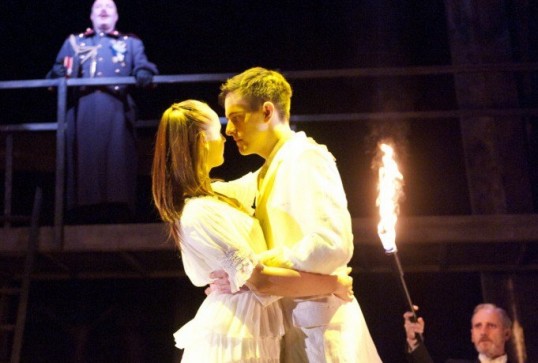Theatre Review – Romeo and Juliet
✭✭✭✭✩ Astonishingly vivid
The Royal Lyceum: October 2010
Simple, clear and astonishingly vivid, Tony Cownie has taken Shakespeare’s most performed play and, with one brilliant little twist, created a fresh and timely production.
In many way’s Cownie’s direction is not groundbreaking. He extracts articulate, passionate and engaging performances from his cast. And he continues the Lyceum’s tradition of ensuring that Shakespeare’s lines are spoken in such a way as to make them obvious to a modern audience.
Ben Deery is pitch perfect as Benvolio, a steadying influence on his cousin Romeo and quick wit when Grant O’Rourke’s hilarious, utterly brilliant Mercutio starts mocking his pal about nightly visitations from the fairy Queen Mab.
Alexandra Mathie breaths real life into Nurse – equal to the lads’ vulgar jokes when running errands for Juliet, but not over bawdy in herself. She ensures the audience know that hot lust not pure romance is what lies at the base of Romeo and Juliet’s love.
Liam Brennan brings his considerable talent to Capulet. Brimming with a father’s love for his only daughter, the way he turns on Juliet when she attempts to defy his wish that she marry Paris is raw, passionate and completely devastating.
Over it all, Mark McDonnell is a powerful symbol of failed military authority as the Prince, trying to keep peace between Montague and Capulet. Sean Murray’s Friar Lawrence portrays the weaknesses of a church without moral authority in the friar’s convoluted attempts to get Romeo and Juliet together.
So much you would hope for. But Cownie’s triumph is in his creation of an opening tableau to the play.
While McDonnell tells the well-worn prologue of “two households, both alike in dignity”, Will Featherstone’s Romeo and Kirsty Mackay’s Juliet appear as a statue of an embracing couple. At their feet, their fathers reach out to clasp each others hands in equal mourning.
As a twist, this moves the focus away from Romeo and Juliet’s love. Featherstone and Mackay play it out with a purity of purpose, to be sure, but it is on the surrounding institutions: family, state and church, that the production turns its unstinting light. All three, it seems, are equally to blame in this fine, fine production.
Run ends October 16
This review first appeared in the Edinburgh Evening News



















